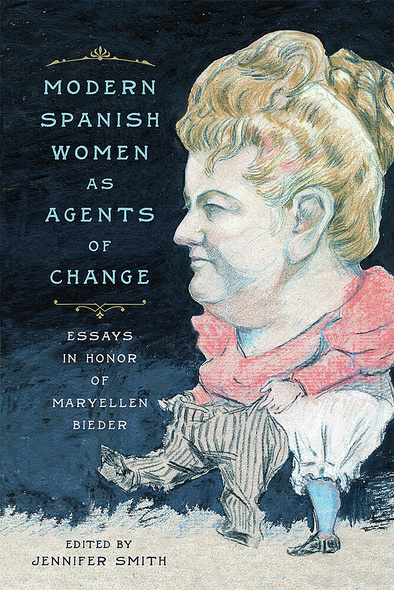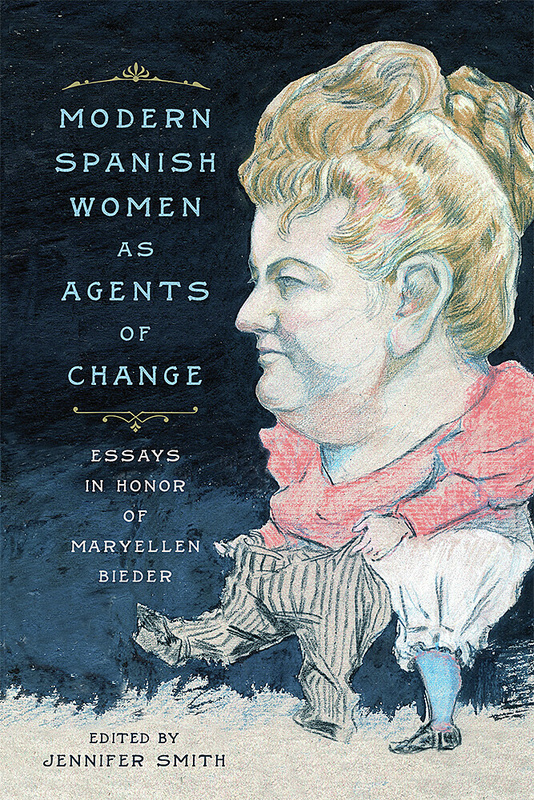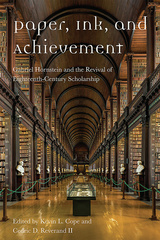Modern Spanish Women as Agents of Change
Essays in Honor of Maryellen Bieder
Edited by Jennifer Smith
Bucknell University Press
This volume brings together cutting-edge research on modern Spanish women as writers, activists, and embodiments of cultural change, and simultaneously honors Maryellen Bieder’s invaluable scholarly contribution to the field. The essays are innovative in their consideration of lesser-known women writers, focus on women as political activists, and use of post-colonialism, queer theory, and spatial theory to examine the period from the Enlightenment until World War II. The contributors study women as agents and representations of social change in a variety of genres, including short stories, novels, plays, personal letters, and journalistic pieces. Canonical authors such as Emilia Pardo Bazán, Leopoldo Alas “Clarín,” and Carmen de Burgos are considered alongside lesser known writers and activists such as María Rosa Gálvez, Sofía Tartilán, and Caterina Albert i Paradís. The critical analyses are situated within their specific socio-historical context, and shed new light on nineteenth- and early twentieth-century Spanish literature, history, and culture.
Published by Bucknell University Press. Distributed worldwide by Rutgers University Press.
Published by Bucknell University Press. Distributed worldwide by Rutgers University Press.
Well-written and insightful.'
The volume demonstrates the need to continue learning about the historical and cultural legacy of these women as agents of change and modernity to understand in more detail the role of Spanish women in the present moment, a moment that is challenging the anti-feminist and conservative discourse on both sides of the Atlantic as outdated.
The volume adds to our understanding of nineteenth-century women’s agency and the lead roles played by women in conversations about modernity and national identity within the cultural, literary and political spheres. The volume also models the same kind of literary activism championed by some of the women whose work inspires its various chapters.
An outstanding contribution of cutting-edge research to students and scholars of feminist discourses, gender studies, and modern Peninsular literatures and cultures.
Jennifer Smith continues to vindicate the validity of feminism today. There is no doubt that Maryellen Bieder would be proud of the legacy passed on to her numerous disciples and colleagues.
An outstanding work of collaborative scholarship and unreservedly recommended for community Women's Studies sections, as well as college and university library Literary & Iberian Studies collections.
This book is a beautiful tribute to Maryellen Bieder, an important and significant scholar of nineteenth- and twentieth-century Spanish narrative by women. The essays in this book—by scholars and writers of several different generations who are also highly esteemed in the same and other areas—expand and continue Bieder’s research to new horizons. Modern Spanish Women as Agents of Change is a very important contribution to the field: it continues current research, embarks on new areas of investigation, and employs distinct or innovative theoretical ideas.
This book is a beautiful tribute to Maryellen Bieder, an important and significant scholar of nineteenth- and twentieth-century Spanish narrative by women. The essays in this book—by scholars and writers of several different generations who are also highly esteemed in the same and other areas—expand and continue Bieder’s research to new horizons. Modern Spanish Women as Agents of Change is a very important contribution to the field: it continues current research, embarks on new areas of investigation, and employs distinct or innovative theoretical ideas.
An outstanding work of collaborative scholarship and unreservedly recommended for community Women's Studies sections, as well as college and university library Literary Iberian Studies collections.
Jennifer Smith continues to vindicate the validity of feminism today. There is no doubt that Maryellen Bieder would be proud of the legacy passed on to her numerous disciples and colleagues.
An outstanding contribution of cutting-edge research to students and scholars of feminist discourses, gender studies, and modern Peninsular literatures and cultures.
The volume adds to our understanding of nineteenth-century women’s agency and the lead roles played by women in conversations about modernity and national identity within the cultural, literary and political spheres. The volume also models the same kind of literary activism championed by some of the women whose work inspires its various chapters.
The volume demonstrates the need to continue learning about the historical and cultural legacy of these women as agents of change and modernity to understand in more detail the role of Spanish women in the present moment, a moment that is challenging the anti-feminist and conservative discourse on both sides of the Atlantic as outdated.
Well-written and insightful.'
JENNIFER SMITH is an Associate Professor of Spanish and Interim Chair of the Department of Languages, Cultures, and International Trade at Southern Illinois University in Carbondale. She is the coeditor of Intersections of Race, Class, Gender, and Nation in Fin-de-Siècle Spanish Literature and Culture.
A Note on Translations … v
Introduction ... 1
Jennifer Smith
Part I: Modern Spanish Women Writers as Activists ... 26
One Gender, Race, and Subalternity in the Antislavery Plays of María Rosa Gálvez and Faustina Sáez de Melgar ... 27
Akiko Tsuchiya
Two Forging Progressive Futures for Spain’s Women and People: Sofía Tartilán (Palencia 1829-Madrid 1888) ... 55
Christine Arkinstall
Three Fashion as Feminism: Carmen de Burgos’s Ideas on Fashion in Context ... 94
Roberta Johnson
Part II: Emilia Pardo Bazán as Literary Theorist and Cultural Critic ... 119
Four Pardo Bazán’s “Apuntes autobiográficos”and “El baile del Querubín”: A Theoretical Reexamination ... 120
Susan M. McKenna
Five The Twice-Told and the Unsaid in Pardo Bazán’s “Presentido,” “En coche-cama,” “Confidencia,” and “Madre” ... 147
Linda M. Willem
Six Emilia Pardo Bazán, Joris-Karl Huysmans, and Stories of Conversion ... 175
Denise DuPont
Seven “A Most Promising Girl”: Gender and Artistic Future in Emilia Pardo Bazán’s “La dama joven” ... 205
Margot Versteeg
Part III:Representations of Female Deviance ... 237
Eight A Woman’s Search for a Space of Her Own in Gertrudis Gómez de Avellaneda's Dos mujeres ... 238
Rogelia Lily Ibarra
Nine Caterina Albert i Paradís: Writing, Solitude, and Woman’s Jouissance, translated by Lourdes Albuixech... 261
Neus Carbonell
Ten The Obstinate Negativity of Ana Ozores ... 289
Jo Labanyi
Eleven Female Masculinity in La Regenta ... 307
Jennifer Smith
Afterword ... 333
Acknowledgments... 337
Bibliography ... 338
Index ... 373
About the Contributors ... 374
Introduction ... 1
Jennifer Smith
Part I: Modern Spanish Women Writers as Activists ... 26
One Gender, Race, and Subalternity in the Antislavery Plays of María Rosa Gálvez and Faustina Sáez de Melgar ... 27
Akiko Tsuchiya
Two Forging Progressive Futures for Spain’s Women and People: Sofía Tartilán (Palencia 1829-Madrid 1888) ... 55
Christine Arkinstall
Three Fashion as Feminism: Carmen de Burgos’s Ideas on Fashion in Context ... 94
Roberta Johnson
Part II: Emilia Pardo Bazán as Literary Theorist and Cultural Critic ... 119
Four Pardo Bazán’s “Apuntes autobiográficos”and “El baile del Querubín”: A Theoretical Reexamination ... 120
Susan M. McKenna
Five The Twice-Told and the Unsaid in Pardo Bazán’s “Presentido,” “En coche-cama,” “Confidencia,” and “Madre” ... 147
Linda M. Willem
Six Emilia Pardo Bazán, Joris-Karl Huysmans, and Stories of Conversion ... 175
Denise DuPont
Seven “A Most Promising Girl”: Gender and Artistic Future in Emilia Pardo Bazán’s “La dama joven” ... 205
Margot Versteeg
Part III:Representations of Female Deviance ... 237
Eight A Woman’s Search for a Space of Her Own in Gertrudis Gómez de Avellaneda's Dos mujeres ... 238
Rogelia Lily Ibarra
Nine Caterina Albert i Paradís: Writing, Solitude, and Woman’s Jouissance, translated by Lourdes Albuixech... 261
Neus Carbonell
Ten The Obstinate Negativity of Ana Ozores ... 289
Jo Labanyi
Eleven Female Masculinity in La Regenta ... 307
Jennifer Smith
Afterword ... 333
Acknowledgments... 337
Bibliography ... 338
Index ... 373
About the Contributors ... 374








